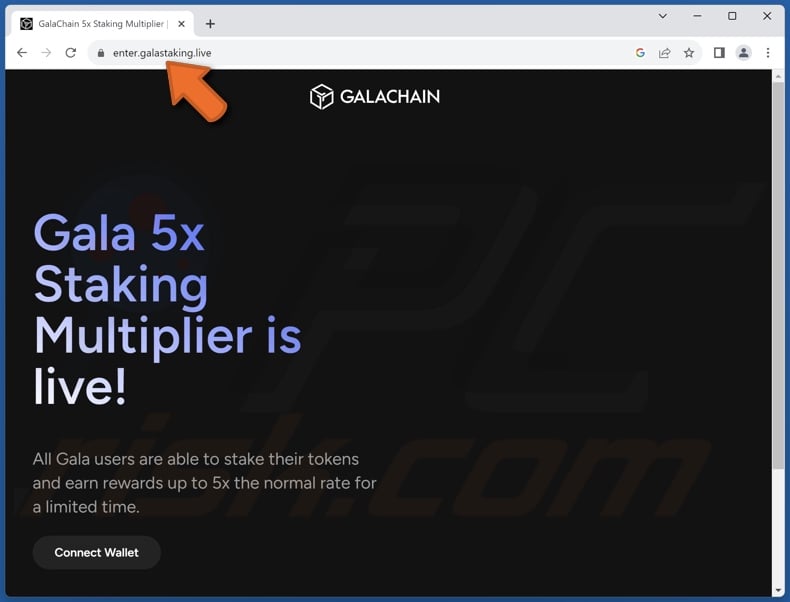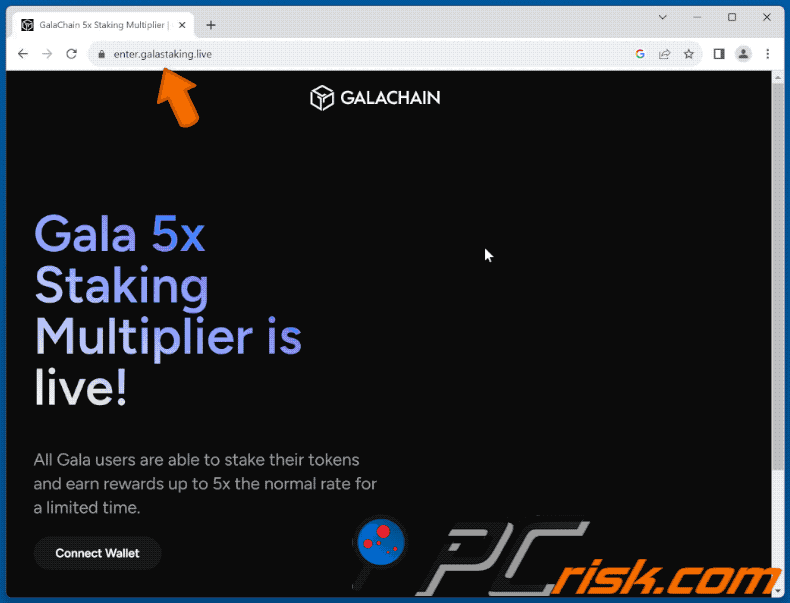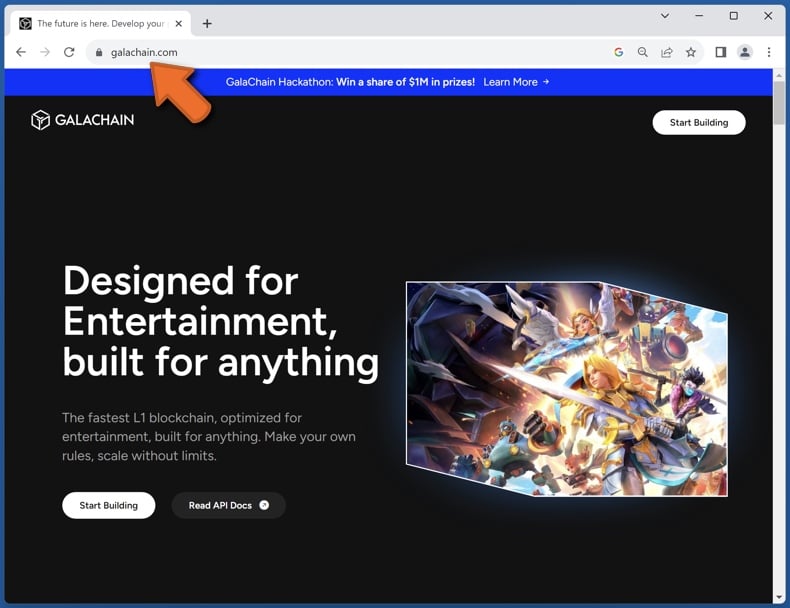Avoid getting scammed by fake Gala websites offering boons on staking
Phishing/ScamAlso Known As: "Gala Staking" crypto drainer scam
Get free scan and check if your device is infected.
Remove it nowTo use full-featured product, you have to purchase a license for Combo Cleaner. Seven days free trial available. Combo Cleaner is owned and operated by RCS LT, the parent company of PCRisk.com.
What kind of scam is "Gala Staking"?
"Gala Staking" is a scam that masquerades as the Gala blockchain network (galachain.com). This scheme promotes a limited-time event for up to five times the regular rate on staked tokens. "Gala Staking" operates as a crypto drainer that steals cryptocurrency from exposed digital wallets.

"Gala Staking" scam overview
This scam utilizes graphics from the official Gala platform. Users are lured into "connecting" their cryptocurrency wallets to this scheme by a promise of up to 5x the standard rate for staking tokens.
It must be emphasized that this limited-time offer is fake, and this scam is not associated with Gala or any other legitimate platforms and entities.
Drainers execute automated transfers from victims' wallets to those owned by cyber criminals. These scripts may be capable of approximating the value of digital assets and prioritizing them. The transactions may appear generic and vague, thereby not raising immediate suspicion.
The scope of the financial loss depends on the assets' value. It is worth mentioning that cryptocurrency transactions cannot be reversed because of their practically untraceable nature. Therefore, victims of scams like "Gala Staking" cannot retrieve their funds.
| Name | "Gala Staking" crypto drainer scam |
| Threat Type | Phishing, Scam, Social Engineering, Fraud |
| Fake Claim | Limited-time offer for up to 5x the regular rate on token staking. |
| Disguise | Gala |
| Related Domains | enter.galastaking[.]live |
| Detection Names | Fortinet (Spam), Full List Of Detections (VirusTotal) |
| Serving IP Address | 104.21.94.252 |
| Distribution methods | Compromised websites, social media spam, rogue online pop-up ads, potentially unwanted applications. |
| Damage | Monetary loss |
| Malware Removal (Windows) |
To eliminate possible malware infections, scan your computer with legitimate antivirus software. Our security researchers recommend using Combo Cleaner. Download Combo CleanerTo use full-featured product, you have to purchase a license for Combo Cleaner. 7 days free trial available. Combo Cleaner is owned and operated by RCS LT, the parent company of PCRisk.com. |
Cryptocurrency drainer scam examples
We have researched thousands of online scams; "Metable AirDrop", "STAKE MERLIN SPELLBOOKS", and "Lido Token Airdrop" are just a couple examples of crypto drainers that we have written about recently.
Cryptocurrency-centered schemes use various false claims and promises to deceive users, e.g., increased returns, airdrops, new coin/token promotions, mass adoption efforts for cryptocurrency, suspicious activity on wallets, security upgrades, etc.
However, regardless of what scams offer or warn about, the end goal is the same – to generate revenue at victims' expense.
How did I open a scam website?
Crypto drainers have been widely promoted through malvertising. To elaborate, intrusive advertisements that promise various boons are used for this purpose. Some of the pop-ups include operational wallet-draining mechanisms. It is pertinent to mention that these ads were even encountered on genuine websites that had been compromised.
Additionally, cryptocurrency-specific scams are pushed via social media spam. Promotional posts and PMs/DMs can be made using reputable accounts (e.g., ones stolen from crypto projects, companies, organizations, influencers, etc.).
Other prevalent endorsement techniques are sites using rogue advertising networks, spam (e.g., emails, SMSes, forum posts, browser notifications, etc.), mistyped URLs (typosquatting), and adware.
How to avoid visiting scam websites?
We highly recommend caution while browsing. It is crucial to pay attention to URLs and enter them carefully. Another recommendation is to be selective about which pages are allowed to display browser notifications. Dubious sites must not be permitted; instead, the requests have to be ignored or denied (i.e., by clicking "Block", "Block Notifications", etc.).
We advise against visiting websites that offer pirated programs/media or other questionable services (e.g., Torrenting, illegal streaming/downloading, etc.), as these webpages are usually monetized via rogue advertising networks.
Incoming emails and other messages have to be treated with vigilance. Attachments or links present in suspicious/irrelevant mail must not be opened.
To prevent bundled/harmful software from infiltrating the device – we advise downloading only from official/trustworthy channels and treating installations with care (e.g., reading terms, inspecting options, using "Custom/Advanced" settings, and opting out of additional apps, extensions, tools, etc.).
If your computer is already infected, we recommend running a scan with Combo Cleaner Antivirus for Windows to automatically eliminate all threats.
The appearance of "Gala Staking" scam (GIF):

Screenshot of Gala's official website (galachain.com):

Instant automatic malware removal:
Manual threat removal might be a lengthy and complicated process that requires advanced IT skills. Combo Cleaner is a professional automatic malware removal tool that is recommended to get rid of malware. Download it by clicking the button below:
DOWNLOAD Combo CleanerBy downloading any software listed on this website you agree to our Privacy Policy and Terms of Use. To use full-featured product, you have to purchase a license for Combo Cleaner. 7 days free trial available. Combo Cleaner is owned and operated by RCS LT, the parent company of PCRisk.com.
Quick menu:
- What is "Gala Staking" crypto drainer scam?
- How to identify a pop-up scam?
- How do pop-up scams work?
- How to remove fake pop-ups?
- How to prevent fake pop-ups?
- What to do if you fell for a pop-up scam?
How to identify a pop-up scam?
Pop-up windows with various fake messages are a common type of lures cybercriminals use. They collect sensitive personal data, trick Internet users into calling fake tech support numbers, subscribe to useless online services, invest in shady cryptocurrency schemes, etc.
While in the majority of cases these pop-ups don't infect users' devices with malware, they can cause direct monetary loss or could result in identity theft.
Cybercriminals strive to create their rogue pop-up windows to look trustworthy, however, scams typically have the following characteristics:
- Spelling mistakes and non-professional images - Closely inspect the information displayed in a pop-up. Spelling mistakes and unprofessional images could be a sign of a scam.
- Sense of urgency - Countdown timer with a couple of minutes on it, asking you to enter your personal information or subscribe to some online service.
- Statements that you won something - If you haven't participated in a lottery, online competition, etc., and you see a pop-up window stating that you won.
- Computer or mobile device scan - A pop-up window that scans your device and informs of detected issues - is undoubtedly a scam; webpages cannot perform such actions.
- Exclusivity - Pop-up windows stating that only you are given secret access to a financial scheme that can quickly make you rich.
Example of a pop-up scam:

How do pop-up scams work?
Cybercriminals and deceptive marketers usually use various advertising networks, search engine poisoning techniques, and shady websites to generate traffic to their pop-ups. Users land on their online lures after clicking on fake download buttons, using a torrent website, or simply clicking on an Internet search engine result.
Based on users' location and device information, they are presented with a scam pop-up. Lures presented in such pop-ups range from get-rich-quick schemes to fake virus scans.
How to remove fake pop-ups?
In most cases, pop-up scams do not infect users' devices with malware. If you encountered a scam pop-up, simply closing it should be enough. In some cases scam, pop-ups may be hard to close; in such cases - close your Internet browser and restart it.
In extremely rare cases, you might need to reset your Internet browser. For this, use our instructions explaining how to reset Internet browser settings.
How to prevent fake pop-ups?
To prevent seeing pop-up scams, you should visit only reputable websites. Torrent, Crack, free online movie streaming, YouTube video download, and other websites of similar reputation commonly redirect Internet users to pop-up scams.
To minimize the risk of encountering pop-up scams, you should keep your Internet browsers up-to-date and use reputable anti-malware application. For this purpose, we recommend Combo Cleaner Antivirus for Windows.
What to do if you fell for a pop-up scam?
This depends on the type of scam that you fell for. Most commonly, pop-up scams try to trick users into sending money, giving away personal information, or giving access to one's device.
- If you sent money to scammers: You should contact your financial institution and explain that you were scammed. If informed promptly, there's a chance to get your money back.
- If you gave away your personal information: You should change your passwords and enable two-factor authentication in all online services that you use. Visit Federal Trade Commission to report identity theft and get personalized recovery steps.
- If you let scammers connect to your device: You should scan your computer with reputable anti-malware (we recommend Combo Cleaner Antivirus for Windows) - cyber criminals could have planted trojans, keyloggers, and other malware, don't use your computer until removing possible threats.
- Help other Internet users: report Internet scams to Federal Trade Commission.
Frequently Asked Questions (FAQ)
What is an online scam?
Online scams are a type of fraud promoted on the Internet. These schemes aim to deceive users into performing specific actions, e.g., connecting cryptowallets to cryptocurrency drainers, making monetary transactions, disclosing private information, buying products, subscribing to services, downloading/installing software, etc.
What is the purpose of online scams?
The motivation behind online scams is profit. Cyber criminals primarily generate revenue by obtaining funds through deception, promoting content, abusing/selling sensitive information, and spreading malware.
I have lost cryptocurrency to the "Gala Staking" scam, can I get my money back?
No, cryptocurrency transactions cannot be reversed due to their nearly untraceable nature. This makes it impossible for victims to return the stolen funds.
Why do I encounter online scams?
Online scams are mainly endorsed via spam (e.g., emails, SMSes, DMs/PMs, browser notifications, social media/ forum posts, etc.), sites that utilize rogue advertising networks, misspelled URLs (typosquatting), intrusive ads (malvertising), and adware.
Will Combo Cleaner protect me from online scams?
Combo Cleaner is capable of scanning every single website that you visit and detecting deceptive/malicious ones. Hence, if you enter such a webpage – you will be immediately warned, and further access to it will be restricted.
Share:

Tomas Meskauskas
Expert security researcher, professional malware analyst
I am passionate about computer security and technology. I have an experience of over 10 years working in various companies related to computer technical issue solving and Internet security. I have been working as an author and editor for pcrisk.com since 2010. Follow me on Twitter and LinkedIn to stay informed about the latest online security threats.
PCrisk security portal is brought by a company RCS LT.
Joined forces of security researchers help educate computer users about the latest online security threats. More information about the company RCS LT.
Our malware removal guides are free. However, if you want to support us you can send us a donation.
DonatePCrisk security portal is brought by a company RCS LT.
Joined forces of security researchers help educate computer users about the latest online security threats. More information about the company RCS LT.
Our malware removal guides are free. However, if you want to support us you can send us a donation.
Donate
▼ Show Discussion